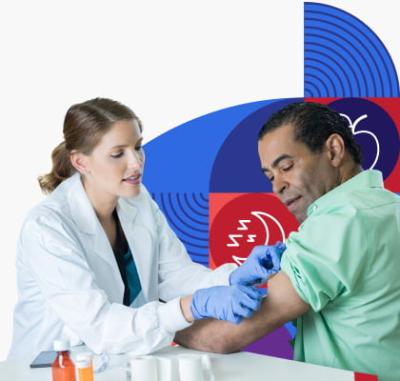Doctor Visits
Get Screened

The Basics
Overview
Screenings are medical tests that doctors use to check for diseases and health conditions before there are any signs or symptoms. Screenings help find problems early on, when they may be easier to treat.
Getting recommended screenings is one of the most important things you can do for your health. Depending on your age, sex, and medical history, you may need to be screened (tested) for things like:
- Certain types of cancer
- High blood pressure or high cholesterol
- Diabetes
- Osteoporosis (weak bones)
- STIs (sexually transmitted infections), also called STDs (sexually transmitted diseases)
- Mental health conditions, like depression or anxiety
What happens during a screening?
That depends on what problem the doctor is checking for. For example, a screening could be a blood test, a physical exam, or a list of questions your doctor asks you.
Take Action
Get Ready
Talk with your doctor or nurse about which screening tests are right for you.
Find out which screenings you may need.
Use the MyHealthfinder tool to get personalized recommendations for preventive services. Print out the list of recommendations and take it with you to your next doctor’s appointment.
Gather your family’s medical history.
Talk to your relatives to find out if any diseases run in your family. Use this family health history tool to keep track of what you learn. Then share the information with your doctor.
Make a list of questions to ask your doctor.
When you visit the doctor, it helps to write down your questions ahead of time.
Check out these questions for the doctor about screenings for:
Find questions for the doctor about additional health topics. You can also use this tool to build your own list of questions for the doctor.
See Your Doctor
Talk with your doctor about getting screened.
Having a conversation with your doctor or nurse can help you understand which screenings you need — and how often to get them. You may need to get some tests once a year. You may need other tests more or less often.
Tell your doctor or nurse about diseases that run in your family, and share any concerns you have about your health. This will help you decide together which screenings are right for you.
If you don’t have a doctor or nurse, check out these tips for choosing a doctor you can trust.
Ask your doctor about the risks and benefits.
When your doctor recommends a screening, ask questions about the risks and benefits.
All screening tests have potential risks. For example, some tests can cause problems like bleeding or infection.
Sometimes, tests can give the wrong result. For example, a test could say that you have a disease when you really don't (false positive). This can be stressful — and could lead to more tests that also have risks.
Your doctor can help you decide if the benefits of a screening outweigh the risks for you. Having an open and honest conversation with your doctor can help you make a decision you feel comfortable with.
Make sure you get the results from every screening.
Ask how long it will take to get your test results. If the doctor doesn’t contact you with the results, call the office to ask for them. And if you don’t understand what the results mean, ask the doctor or nurse to explain them to you.
Cost and Insurance
What about cost?
Under the Affordable Care Act, insurance plans must cover many screening tests. This means you may be able to get screening tests at no cost to you. Check with your insurance company to find out more. You can also:
- Find out which services are covered under the Affordable Care Act
- Find out which screenings are covered by Medicare
If you don't have insurance, you may still be able to get free or low-cost screening tests. Find a health center near you to learn more.
Content last updated January 27, 2026
Reviewer Information
This information on screening was adapted from materials from the Agency for Healthcare Research and Quality, the Office of the Surgeon General, and the Office on Women’s Health (OWH).
Reviewed by:
Sheena Harris, MD, MPH
Center for Evidence and Practice Improvement
Agency for Healthcare Research and Quality


